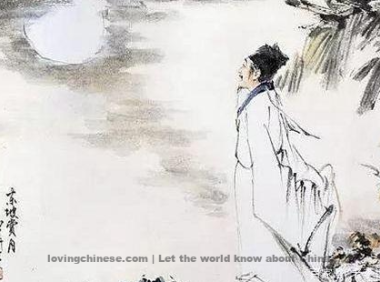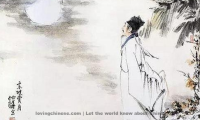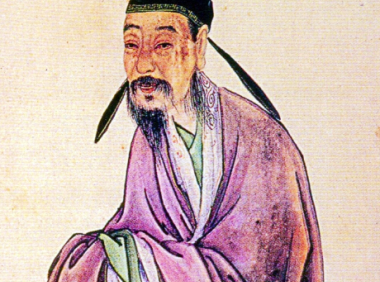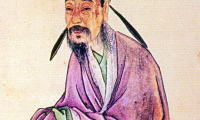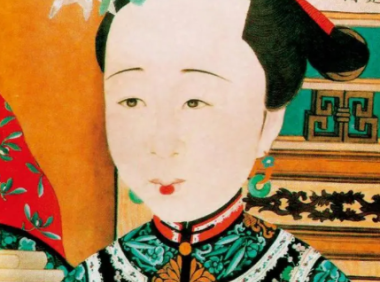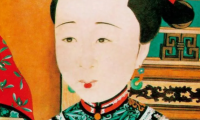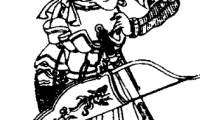-
Su Shi: The Clouds at Dusk are all Cleared
阳关曲·中秋月 原作:苏东坡 (11世纪) 英译:闵晓红(2022) 暮云收尽溢清寒, 银汉无声转玉盘。此生此夜不长好, 明月明年何处看? The Clouds at Dusk have All Cleared Up - to the tune of Yangguan written by Su Dongpo(11th century) translated by Julia Min (2022) The clouds at dusk have all cleared up, and here, you and me under the blue and cool empyrean. The Milky Way, so quiet, slowly appears, pulling the full and bright moon high and near. This night of this life will be over soon; Where might we be to see the moon next year? For appreciation: This poem moves from natural scenery to the sentiments inside the poet’s mind – a common practice in poetry. The source text is one four-line stanza, while the English version is restructured and settled at six lines. The poem was composed in 1077 when finally the two brothers ( Su Shi and Su Zhe) joined together for the Moon Festival after being apart for 8 years. The previous Moon Festival saw the birth of his masterpiece “When was the Moon ever so Bright”. You could imagine the joy they shared when they quietly sat there in the garden as in childhood, maybe together with other friends, waiting for the dusk clouds cleared for…...
- 0
- 0
- 50
-
Su Shi: To Zhang Woquan, at the Bracing Pavilion of Huangzhou
水调歌头 黄州快哉亭赠张偓佺 原作:苏轼( 11th Century) 英译旧版:戈登.奥赛茵,闵晓红(1990) 英译新版:闵晓红(2023) 落日绣帘卷, 亭下水连空。 知君为我, 新作窗户湿青红。 长记平山堂上, 欹枕江南烟雨, 杳杳没孤鸿。 认得醉翁语, 山色有无中。 一千顷, 都镜净, 倒碧峰。 忽然浪起, 掀舞一叶白头翁。 堪笑兰台公子, 未解庄生天籁, 刚道有雌雄。 一点浩然气, 千里快哉风。 To Zhang Woquan,at the Bracing Pavilion of Huangzhou - to the tune “River Tune’s First Notes” Written by: Su Shi (11th AC, social name 'Dongpo') En. trans. by: G. Osing, J. Min & H. Huang (1990) En. revision by: Julia Min ( Feb. 2023) The embroidered curtains rolled at sunset, the river before the porch runs to the sky. The scarlet ink is shining, paint still wet, just for me, this window, this splendid sight. I often recall my times at the Hall of Mt Ping for the mist and rains of River South’s spring. The best view was from the window on my pillow. Some lonely goose would fly by and out of sight. “The hills appear to disappear” in drifting smoke…. I could taste Xiu’s thinking in his drinking ci poem. The river by the pavilion spreads far and wide, like broad sea, mirrors easily all the green peaks. A wind rises, lifting as if a white leaf yonder -- an old boy in his boat winding down the river, as free…...
- 0
- 0
- 53
-
Su Shi: Meditating on the Past at the Red Cliff
念奴娇.赤壁怀古 原作: 苏轼(11世纪北宋) 中英旧版: 戈登.奥赛茵, 闵晓红, 黄海鹏(1990) 英版修改: 闵晓红(2023) 大江东去浪淘尽, 千古风流人物。 故垒西边人道是, 三国周郎赤壁。 乱石崩云, 惊涛裂岸, 卷起千堆雪。 江山如画, 一时多少豪杰! 遥想公瑾当年, 小乔初嫁了, 雄姿英发。 羽扇纶巾谈笑间, 樯橹灰飞烟灭。 故国神游, 多情应笑我, 早生华发。 人生如梦, 一樽还酹江月。 Meditating on the Past at the Red Cliff - to the tune of Niannujiao written by: Su Shi (11th Century) First En. trans. by: G. Osing, J. Min & H. Huang (1990) En. revision by: Julia Min (2023) To the East Sea flows the Yangtze River, washing away forever, in tides of times, all the heroes of the past we remember. On the west side of this slopy stronghold, some say, in Three Kingdoms’ chaotic era, Zhou Yu won his Red Cliff Battle on water. What a splendid picture was unfolded across -- walls of rolled waves crashing on savage rocks, great bursts of snowy foam pervading the shore. So many noted warriors came forth and fought. Long before, the younger Qiao, a girl of virtues, married Gongjin, a youth of valor and values. With silk bonnet on head, a feather fan in hand, he chatted at ease as he had victory achieved. The tides had turned, sailed his burning boats over, Cao Cao’s fleet jammed in smoke, doomed in fire… Where…...
- 0
- 0
- 54
-
Su Shi: A visit to the Clear Stream Temple
浣溪沙. 游蕲水清泉寺 (游蕲水清泉寺,寺临兰溪,溪水西流。) 原作:苏轼( 1082) 英译:闵晓红(2022) 山下兰芽短浸溪, 松间沙路净无泥。 潇潇暮雨子规啼。 谁道人生无再少? 门前流水尚能西! 休向白发唱黄鸡。 A visit to the Clear Stream Temple - to the tune “The Washing Stream“ ( I visit the Clear Stream Temple today at Qishui County. It’s a catching view from the temple on the slope, and the Orchard Stream at the foot of the hill actually flows west, hence the poem.) Written by: Su Shi ( 1082) English trans. by: Julia Min (2022) Down the hill, all along the white sandy beach, sweet orchids are budding again in the stream. A sand path winds into the pine trees, mud free. The dusk, drizzling, hears the cuckoos’ melodies. Who said our time can’t fly back to youth, to teens? Look here, back to west flowing the Orchid Stream! You may stop sighing over your hair turning grey, It’s just your swelling fear by cockcrow or the day. Notes: 1. cuckoos’ melodies: implying a traveller’s homesickness in Chinese culture; 2. back to west: all rivers in China flow from the west to the east, with Yangtse and the Yellow River both sourced from Himalaya region; 3. the Orchid Stream: named in the Tang dynasty for the wild orchids growing like…...
- 0
- 0
- 49
-
Su Shi: A Light Rain in Cold Wind Sways the Willows
浣溪沙. 细雨斜风作晓寒 (元丰七年十二月二十四日,从泗州刘倩叔游南山。) 原作: 苏轼(11世纪北宋) 英译旧版: 戈登.奥赛茵, 闵晓红, 黄海鹏(1990) 英版修改: 闵晓红(2023) 细雨斜风作晓寒, 淡烟疏柳媚晴滩。 入淮清洛渐漫漫。 雪沫乳花浮午盏, 蓼茸蒿笋试春盘。 人间有味是清欢。 A Light Rain in Cold Wind Sways the Willows (I visited Mt South with Liu Qianshu in Sizhou on 24 Dec. 1084) - to the tune “The Washing Stream" written by: Su Shi (1084) 1st En. trans. by: G. Osing, J. Min & H. Huang (1990) En. revision by: Julia Min (2023) A light rain in cold wind sways the willows, Embracing the river banks in drifting smoke. - River Luo feeds into River Huai in vast folds. My lunch is the tade sprouts and bamboo shoots, And the tea crema tops my cup like smooth snow.- The real taste of life roots in a simple living mode. Appreciation: In 1084, Su Shi was moved from Huangzhou to Ruzhou ( in today’s Henan Province), a turning point for his career. On his way passing Sizhou, he visited Mt. South with a friend. The life in the mountain was so peaceful, not to mention the locals had all the fresh produce of spring on the table. His spirit had been troubled with too much chaos and complexity from the so-called civilization, and here, he…...
- 0
- 0
- 60
-
Su Shi: Before the Walls the Bamboos Extend to the Hills
鹧鸪天(时谪黄州) 原作: 苏轼(字子瞻, 号东坡居士; 11世纪北宋) 英译旧版:戈登.奥赛茵, 闵晓红, 黄海朋(1990) 英译修改:闵晓红(2023) 林断山明竹隐墙, 乱蝉衰草小池塘。 翻空白鸟时时见, 照水红蕖细细香。 村舍外,古城旁, 杖藜徐步转斜阳。 殷勤昨夜三更雨, 又得浮生一日凉。 Before the Walls the Bamboos Extend to the Hills - to the tune “ Francolin Sky” written by: Su Shi (11th AC, social name 'Dongpo') En. trans. by: G. Osing, J. Min & H. Huang (1990) En. revision by: Julia Min ( Feb. 2023) Before the walls the bamboos extend to the hills. In drooping grass by the pool the cicadas still trill. Flocks of white birds rise to the sky here and there, Lotus are flushed in water mirror, sweet and subtle. Walking past the village outside the old town, My cane moves slowly and the sun’s going down. How kind and thoughtful was the midnight’s rain, To make this short life of mine fulfilled, still again. Appreciation: This ci was composed at early autumn in 1083. The poet cleanses his senses here with a rich country scene after a rain. The premise is again filled with Taoist implications where an ordinary scene treasures true magic. Sounds familiar? Yeah, Wordsworth and Monet come to mind… Reference: Blooming Alone in Winter by Gordon Osing, Julia Min and Huang Haipeng,published by the People's Publication…...
- 0
- 0
- 49
-
Su Shi: Go back to the mountains!
满庭芳.归去来兮 苏轼 (元丰七年四月一日,余将去黄移汝,留别雪堂邻里二三君子,会仲览自江东来别,遂书以遗之。) 原作: 苏轼(11世纪北宋) 英译旧版: 戈登.奥赛茵, 闵晓红, 黄海鹏(1990) 英版修改: 闵晓红(2023) 归去来兮,吾归何处? 万里家在岷峨。 百年强半, 来日苦无多。 坐见黄州再闰, 儿童尽、楚语吴歌。 山中友,鸡豚社酒, 相劝老东坡。 云何,当此去, 人生底事,来往如梭。 待闲看秋风, 洛水清波。 好在堂前细柳, 应念我、莫剪柔柯。 仍传语,江南父老, 时与晒渔蓑。 Go back to the mountains! But where are they? (On 01 April, 1084, I’m about to leave Huangzhou after being reappointed to another post in Ruzhou. It’s an unforgettable moment saying farewell to my Snow Hall, my good neighbours and a few gentlemen friends. My friend Zhongluan also came all the way from River East.) written by: Su Shi (1084) 1st En. trans. by: G. Osing, J. Min & H. Huang (1990) En. revision by: Julia Min (2023) “Go back to the mountains!” But where are they? Mt. Min and Mt E Mei are a thousand miles away. I’m half a hundred now, numbered are my days, Still idling away to the 2nd leap year since I came. My kids have learned Wu songs and Chu’s lingo. I’ve made many friends from villages in the hills. With chickens, pigs, wine for the shrine, and more, They’re tempting me to grow old at my East Slope. Yet, I’m taking my leave today. What can I say? Time flies faster than a weaver’s shuttle game.…...
- 0
- 0
- 62
-
My First Visit to the Red Cliff
赤壁赋 苏轼 〔宋代〕 壬戌之秋,七月既望,苏子与客泛舟游于赤壁之下。清风徐来,水波不兴。举酒属客,诵明月之诗,歌窈窕之章。少焉,月出于东山之上,徘徊于斗牛之间。白露横江,水光接天。纵一苇之所如,凌万顷之茫然。浩浩乎如冯虚御风,而不知其所止;飘飘乎如遗世独立,羽化而登仙。(冯 通:凭) 于是饮酒乐甚,扣舷而歌之。歌曰:“桂棹兮兰桨,击空明兮溯流光。渺渺兮予怀,望美人兮天一方。”客有吹洞箫者,倚歌而和之。其声呜呜然,如怨如慕,如泣如诉;余音袅袅,不绝如缕。舞幽壑之潜蛟,泣孤舟之嫠妇。 苏子愀然,正襟危坐而问客曰:“何为其然也?”客曰:“‘月明星稀,乌鹊南飞。’此非曹孟德之诗乎?西望夏口,东望武昌,山川相缪,郁乎苍苍,此非孟德之困于周郎者乎?方其破荆州,下江陵,顺流而东也,舳舻千里,旌旗蔽空,酾酒临江,横槊赋诗,固一世之雄也,而今安在哉?况吾与子渔樵于江渚之上,侣鱼虾而友麋鹿,驾一叶之扁舟,举匏樽以相属。寄蜉蝣于天地,渺沧海之一粟。哀吾生之须臾,羡长江之无穷。挟飞仙以遨游,抱明月而长终。知不可乎骤得,托遗响于悲风。” 苏子曰:“客亦知夫水与月乎?逝者如斯,而未尝往也;盈虚者如彼,而卒莫消长也。盖将自其变者而观之,则天地曾不能以一瞬;自其不变者而观之,则物与我皆无尽也,而又何羡乎!且夫天地之间,物各有主,苟非吾之所有,虽一毫而莫取。惟江上之清风,与山间之明月,耳得之而为声,目遇之而成色,取之无禁,用之不竭。是造物者之无尽藏也,而吾与子之所共适。”(共适 一作:共食) 客喜而笑,洗盏更酌。肴核既尽,杯盘狼籍。相与枕藉乎舟中,不知东方之既白。 Simple TranslationIn the autumn of Renxu, on July 16th, I went boating with my friends under the Red Cliff. The breeze blew in gusts, but the water couldn't rise. Raise your glass to persuade your partner to drink, and recite the chapter "Get Lean" in "The Bright Moon". After a while, the bright moon rose from behind the Dongshan Mountain and moved back and forth between Dousu and Niusu. The vast expanse of water vapor traverses the river, and the water light connects the sky. Indulge in a small boat floating like a reed leaf, crossing the vast expanse of the river. The vast and vast expanse of water seems to travel high in the wind, without knowing where to stop. It seems to float and shake as if it is about to leave the world and fly up, turning into a fairy and entering a fairyland.At this moment, he drank and was very happy, singing to the beat. The song reads, "The laurel wood boat paddles, the fragrant orchid boat paddles, beating the clear waves under the moonlight, rising against the current on the moonlit water surface. My thoughts…...
- 0
- 0
- 80
-
Hunting Outside Mizhou
江城子·密州出猎 苏轼 〔宋代〕 老夫聊发少年狂,左牵黄,右擎苍,锦帽貂裘,千骑卷平冈。为报倾城随太守,亲射虎,看孙郎。酒酣胸胆尚开张。鬓微霜,又何妨!持节云中,何日遣冯唐?会挽雕弓如满月,西北望,射天狼。 Simple Translation I would like to express the heroic aspirations of a young man, holding a yellow dog in my left hand, holding a goshawk in my right arm, wearing a colorful hat, wearing a mink fur coat, and carrying a mighty army like a strong wind, sweeping through the flat hills. In order to repay the kindness of the people to go hunting with them, I am determined to personally shoot the tiger and show everyone Sun Quan's heroic demeanor in fighting the tiger."I drink a lot of good wine, have an open mind, have more courage, and have slightly white temples. What's the difference?"? When will the emperor send someone down, trusting me like Emperor Wen of Han sent Feng Tang to the cloud to pardon Wei Shang? At that time, I will make every effort to draw a full carved bow like a full moon, aiming at the northwest and shooting at the Xixia army. 译文(原文)我姑且抒发一下少年的豪情壮志,左手牵着黄犬,右臂托起苍鹰,头戴华美鲜艳的帽子,身穿貂鼠皮衣,带着浩浩荡荡的大部队像疾风一样,席卷平坦的山冈。为了报答百姓随行出猎的厚意,我决心亲自射杀老虎,让大家看看孙权当年搏虎的英姿。我痛饮美酒,心胸开阔,胆气更为豪壮,两鬓微微发白,这又有何妨?什么时候皇帝会派人下来,就像汉文帝派遣冯唐去云中赦免魏尚一样信任我呢?那时我将使尽力气拉满雕弓就像满月一样,瞄准西北,射向西夏军队。...
- 0
- 0
- 69
-
Calming the Waves by Su Shi.
定风波·莫听穿林打叶声 苏轼 〔宋代〕 三月七日,沙湖道中遇雨,雨具先去,同行皆狼狈,余独不觉。已而遂晴,故作此(词)。 莫听穿林打叶声,何妨吟啸且徐行。竹杖芒鞋轻胜马,谁怕?一蓑烟雨任平生。料峭春风吹酒醒,微冷,山头斜照却相迎。回首向来萧瑟处,归去,也无风雨也无晴。 Simple TranslationOn March 7th, 1082, the fifth year of the Yuanfeng reign of Emperor Shenzong of the Song Dynasty, it rained on the Shahu Road. Someone took the rain gear and left first. Everyone along the way felt very embarrassed, but I didn't think so. After a while, it cleared up and I wrote this poem.Don't pay attention to the sound of rain beating through the woods and leaves, why not open your throat and chant the long whistle and walk calmly. Walking with bamboo sticks and awned shoes is lighter than riding a horse. Wearing a coir raincoat, I can still live my life despite the wind and rain!The cool spring breeze wakes up my drunkenness, slightly cold, but the setting sun at the beginning of the mountain meets me in due time. Looking back at the bleak place where the wind and rain came, I walked back, regardless of whether it was rain or sunny. 译文(原文)宋神宗元丰五年(1082)的三月七日,在沙湖道上赶上了下雨,有人带着雨具先走了,同行的人都觉得很狼狈,只有我不这么觉得。过了一会儿天晴了,就做了这首词。 不用注意那穿林打叶的雨声,何妨放开喉咙吟咏长啸从容而行。拄竹杖、穿芒鞋,走得比骑马还轻便,一身蓑衣任凭风吹雨打,照样过我的一生!春风微凉吹醒我的酒意,微微有些冷,山头初晴的斜阳却应时相迎。回头望一眼走过来的风雨萧瑟的地方,我信步归去,不管它是风雨还是放晴。...
- 0
- 0
- 121
-
Recalling the dream at the night ofJanuary 20 of 1075
江城子·乙卯正月二十日夜记梦 苏轼 〔宋代〕十年生死两茫茫,不思量,自难忘。千里孤坟,无处话凄凉。纵使相逢应不识,尘满面,鬓如霜。夜来幽梦忽还乡,小轩窗,正梳妆。相顾无言,惟有泪千行。料得年年肠断处,明月夜,短松冈。 Simple TranslationIt has been ten years since our husband and wife parted, and it will be unforgettable if we cannot bear to miss each other. The solitary grave is thousands of miles away, and there is no place to tell the sadness and desolation in my heart. Even if you and I meet, I'm afraid I won't recognize me. I've been running around with dust all over my temples.Last night, I returned to my hometown in a dream and saw you dressing in front of the small window. You and I are silent to each other, with only a thousand tears falling down. I expect you to be heartbroken for me every year, on that bleak moonlit night, on that lonely short pine hill. 译文(原文)你我夫妻诀别已经整整十年,强忍不去思念可终究难忘怀。孤坟远在千里之外,没有地方能诉说心中的悲伤凄凉。即使你我夫妻相逢怕是也认不出我来了,我四处奔波早已是灰尘满面两鬓如霜。昨夜在梦中回到了家乡,看见你正在小窗前对镜梳妆。你我二人默默相对无言,只有泪落千行。料想你年年都为我柔肠寸断,在那凄冷的月明之夜,在那荒寂的短松冈上。...
- 0
- 0
- 79
-
Niannujiao · Chibi Nostalgia
念奴娇·赤壁怀古 苏轼 〔宋代〕 大江东去,浪淘尽,千古风流人物。故垒西边,人道是,三国周郎赤壁。乱石穿空,惊涛拍岸,卷起千堆雪。(穿空 一作:崩云)江山如画,一时多少豪杰。 遥想公瑾当年,小乔初嫁了,雄姿英发。羽扇纶巾,谈笑间,樯橹灰飞烟灭。(樯橹 一作:强虏)故国神游,多情应笑我,早生华发。人生如梦,一尊还酹江月。(人生 一作:人间;尊 同:樽) Simple TranslationThe water of the great river keeps flowing eastward, and the surging waves wash away the heroes of the ages.To the west of the old camp, people say it was the Red Cliff where Zhou Lang smashed Cao's troops during the Three Kingdoms period.The shore is littered with rocks, as if to pierce the sky. Amazing waves are pounding the river bank, stirring up waves like thousands of piles of snow.The magnificent rivers and mountains are as beautiful as pictures, and how many heroes and heroines have emerged at one time.Looking back on Zhou Yu's triumphant years, Xiao Qiao has just married him as his wife, with a heroic and vigorous demeanor."I waved a feather fan and wore a silk scarf on my head, and while talking and laughing, I burned the powerful enemy's warships to ashes.".Now that I am walking in the ancient battlefield and wandering in the past, it is ridiculous that I have so much nostalgic tenderness that my temples are graying like those of premature aging.Life is like a dream, and sprinkle a glass of wine to commemorate the bright moon on the river. 译文(原文)大江之水滚滚不断向东流去,滔滔巨浪淘尽千古英雄人物。那旧营垒的西边,人们说那就是三国时周郎大破曹兵的赤壁。岸边乱石林立,像要刺破天空,惊人的巨浪拍击着江岸,激起的浪花好似千万堆白雪。雄壮的江山奇丽如图画,一时间涌现出多少英雄豪杰。 遥想当年的周瑜春风得意,小乔刚刚嫁给了他做妻子,英姿雄健风度翩翩神采照人。手摇羽扇头戴纶巾,谈笑之间,就把强敌的战船烧得灰飞烟灭。如今我身临古战场神游往昔,可笑我有如此多的怀古柔情,竟如同未老先衰般鬓发斑白。人生犹如一场梦,且洒一杯酒祭奠江上的明月。...
- 0
- 0
- 101
-
Shuidiao Songtou – When Will the Bright Moon Come
水调歌头·明月几时有 苏轼 〔宋代〕 丙辰中秋,欢饮达旦,大醉,作此篇,兼怀子由。 明月几时有?把酒问青天。不知天上宫阙,今夕是何年。我欲乘风归去,又恐琼楼玉宇,高处不胜寒。起舞弄清影,何似在人间。(何似 一作:何时;又恐 一作:惟 / 唯恐)转朱阁,低绮户,照无眠。不应有恨,何事长向别时圆?人有悲欢离合,月有阴晴圆缺,此事古难全。但愿人长久,千里共婵娟。(长向 一作:偏向) Simple TranslationDuring the Mid-Autumn Festival in the year of Bingchen (1076 AD), I drank heavily all night until dawn and became drunk. I took the opportunity to write this article while expressing my yearning for my younger brother and disciple You.When will the bright moon like the Mid Autumn Festival come? I held a glass of wine and asked the sky. I don't know what day Gao Yao is in the upper palace. I wanted to take a look back in the sky with the wind, but I was worried that the beautiful jade buildings were too high for me to withstand the cold. Get up and dance to enjoy your clear shadow under the moonlight. The moon palace is no warmer than human fireworks.The moon moved and turned over the vermilion pavilion, hanging low on the carved window, illuminating the sleepless person. The bright moon shouldn't have any resentment towards people, but why does it always come round when people leave? There are joys and sorrows in life, and the moon is often full and short. (The moon happens to be full when people want to be reunited) Such…...
- 0
- 0
- 85
-
Wang Wei: The Zhongnan Mountains
Wang Wei 终南山 王维 太乙近天都,连山到海隅。白云回望合,青霭入看无。分野中峰变,阴晴众壑殊。欲投人处宿,隔水问樵夫。 The Zhongnan Mountains O mighty peaks with Heaven linedA-rolling on to distant sea!The fleecy clouds close up from behind,Blue mists, when near, are nowhere to see.The Central Peak is where to holdAll valleys, bright and dark, in view.But where to pass the night so cold?'Cross the stream's a woodman—"How d'ye do!" hidden contents.等等...
- 0
- 0
- 86
-
Gu Taiqing: Jiang Chengzi: Recording a Dream
江城子·记梦 顾太清 烟笼寒水月笼沙, 泛灵槎, 访仙家。 一路清溪双桨破烟划。 才过小桥风景变, 明月下, 见梅花。 梅花万树影交加, 山之涯。 水之涯。 淡宕湖天韶秀总堪夸。 我欲遍游香雪海, 惊梦醒, 怨啼鸦。 Jiang Chengzi: Recording a Dream Gu Taiqing Haze envelops the cold water, moonlight envelops the sand. Floating on a magic raft, I visit an immortal’s home. A clear stream all along the way, The two oars rise and fall, breaking the mist. Just past the little bridge the scenery changes: Under the bright moon, I see blossoming plum trees. A myriad of blossoming plum trees: their shadows intertwine To the edge of the hills, To the edge of the waters. They fall into the lake’s reflected heaven: Their loveliness certainly worthy of praise. I wanted to travel all over the sea of fragrant snow But startled out of my dream I blame the cawing crow. (David McCraw 译)...
- 0
- 0
- 84
-
Gu Taiqing: Qiubo mei: Sitting at Night
秋波媚·夜坐 顾太清 自笑当年费苦吟。 陈迹梦难寻。 几卷诗篇, 几张画稿, 几许光阴。 唾壶击碎频搔首, 磨灭旧胸襟。 而今赢得, 千丝眼泪, 一个愁心。 Qiubo mei: Sitting at Night Gu Taiqing I laugh at my earlier self trying to work up verses: Old traces hard to find even in dreams. How many scrolls of poems? How many sketches for paintings? How much time has been... The spittoon shattered from tapping, I scratch my head often, Rubbing out my old ambitions. And now all I’ve succeeded in getting is A thousand streaks of tears And a grieving heart. (David McCraw 译)...
- 0
- 0
- 81
-
Gu Taiqing: Que Qiao Xian: After I Dreamed of My Maid Pomegranate
鹊桥仙·梦石榴婢 顾太清 一年死别, 千年幽恨, 尚忆垂髫初会。 眼前难忘小腰身, 侍儿里, 此儿为最。 悠悠往事, 不堪回首, 空堕伤心清泪。 夜深时有梦魂来, 梦觉后, 话多难记。 Que Qiao Xian: After I Dreamed of My Maid Pomegranate Gu Taiqing One year parted by death, A thousand years of deep sorrow. I still remember her childish locks when we first met; In my mind I cannot forget her tiny frame. Among my maids This girl was the best. The past so far from reach, I cannot bear to look back. In vain clear tears fall, breaking my heart. Deep in the night I often dream your soul comes. But when I wake from the dream, I cannot remember most of our talk. (David McCraw 译)...
- 0
- 0
- 95
-
Gu Taiqing: Jiang cheng meihua yin: On a Rainy Day Receiving a Letter from Yunjiang
江城梅花引·雨中接云姜信 顾太清 故人千里寄书来。 快些开, 慢些开, 不知书中, 安否费疑猜。 别后炎凉时序改, 江南北, 动离愁, 自徘徊。 徘徊, 徘徊, 渺予怀。 天一涯, 水一涯, 梦也梦也, 梦不见, 当日裙钗。 谁念碧云, 凝伫费肠回。 明岁君归重见我, 应不似, 别离时, 旧形骸。 Jiang cheng meihua yin: On a Rainy Day Receiving a Letter from Yunjiang Gu Taiqing Letter from a friend a thousand miles away: Open it quick! Open it slow! What’s in this letter? Is she well or not? My mind is a blank. Since our parting, cool and hot seasons have come and gone; But north and south of the River Arouse in me the grief of separation as I pace to and fro. To and fro, to and fro, I long for someone far away At the far end of the world, Beyond the water’s edge. I dream, I dream; Yet in my dream I cannot see your hairpin and skirt of those days. Who would remember the dark clouds? I stand transfixed waiting, my heart tied in knots. Next year when you return and see me again I should not be My old self at the time of our parting. (Grace S. Fong 译)...
- 0
- 0
- 70
-
Xue Angfu: Summer To the Tune of Pleasure in Front of Palace
殿前欢·夏 薛昂夫 柳扶疏, 玻璃万顷浸冰壶。 流莺声里笙歌度, 士女相呼, 有丹青画不如。 迷归途, 又撑入荷花深处。 知他是西湖恋我, 我恋西湖? Summer To the Tune of Pleasure in Front of Palace Xue Angfu Swaying are willows far and near, Vast expanse of water is crystal clear, The merry note of orioles mingles with singing. Young men and women are frolicking, That’s more charming than a beautiful painting, They can find no way home, And get lost in the depth of lotus loop. Unaware it’s the West Lake that loves me, Or so attached to the West Lake it’s me. (周方珠 译) Dian Qian Huan Summer Xue Angfu Long and Slim wickers waver in the air, The bright moon’s steeped in the vast glass—like smooth lake water, Sweet girls sing as nightingales to the reed pipes with cheer And rollic in young gentlemen’s deep favor. It’s difficult to paint the wonderful picture. Losing my homeward way for much pleasure, I punt my boat in the depth of lotus once more. Is the beautiful West Lake infatuated with me? Or I’m head over ears in deep love with her? (刘克璋 译)...
- 0
- 0
- 88
-
Gu Taiqing: Zhegu tian
鹧鸪天 顾太清 冬夜听夫子论道,不觉漏三商矣。盆中残梅香发,有悟赋此。 夜半谈经玉漏迟, 生机妙在本无奇。 世人莫恋花香好, 花到香浓是谢时。 蜂酿蜜, 茧抽丝。 功成安得没人知。 华鬉阅尽恒沙劫, 雪北香南觅导师。 Zhegu tian Gu Taiqing On a winter’s night, I sat listening to my husband discourse on the Way. Before we had noticed the hour, midnight struck. A withered plum tree in a pot emitted sweet scent; I felt an Awakening, and so wrote down this lyric. Midnight talk on sutrasjade water clock drips slow. Life’s greatest secrets just where no wonders reside. Worldly folk, don’t cherish the finery of flowery scents: When flowers smell sweetest, they begin to wither away. Bees brew up honey; silkworms spin out silk.1 When the task gets finished, how could no one realize? Withering braids have witnessed every Eon of Endless Sands; 2 North of Snow and South of Scent, I’ll seek a dharma guide.3 1. These lines recall a couplet from Bo Juyi’s allegory “Qin chong shi’er zhang”: “Silkworrms age, cocoons finished not to shelter themselves; / Bees go hungry, honey matures given to someone else.” 2. The Buddhist simile for time calls it infinite as “the sands of the Ganges”; the Chinese call Ganges the “Eternal River.” ‘‘Withering braids / floral garland” (huaman: Sanskrit kusumamala) denote the flowers decorating Buddhist altar…...
- 0
- 0
- 79
-
Gu Taiqing: Ding fengbo: After the Ancient Style
定风波·拟古 顾太清 花里楼台看不真, 绿杨隔断倚楼人。 谁谓含愁独不见, 一片, 桃花人面可怜春。 芳草萋萋天远近, 难问, 马蹄到处总消魂。 数尽归鸦三两阵, 偏衬, 萧萧暮雨又黄昏。 Ding fengbo: After the Ancient Style Gu Taiqing Tower and terrace blossom-wrapped, cannot see for sure. Green willows block and screen off a figure in the tower. Who said it is the held-in sorrows you cannot glimpse? One whole swath… Peach blossoms her face in dear, affecting Spring.1 Fragrant grasses lush and lovely, the skies far or near. So hard to ask… Wherever his horse’s hooves go, they always sear a soul. I’ve counted every last single flock of homing crows. Perverse to add… Dim and dour evening rains again as dusk turns dun. 1. An allusion to the Tang poet Cui Hu’s famous quatrain about returning to a place where once he had met a beauty, only to find her gone: “Last year, on this day, within this very gate, / Her face and peach blossoms shone each other pink. /And now her face wherever has it gone? / Peach blossoms as ever smile in springtime wind” (translated by David McCraw). (David McCraw 译)...
- 0
- 0
- 72
-
Gu Taiqing: Zhuying yao hong: Hearing Eunuch Chen Jinchao of the Pear Garden [the Imperial Troupe] Play the Qin
烛影摇红·听梨园太监陈进朝弹琴 顾太清 雪意沈沈, 北风冷触庭前竹。 白头阿监抱琴来, 未语眉先蹙。 弹遍瑶池旧曲, 韵泠泠, 水流云瀑。 人间天上, 四十年来, 伤心惨目。 尚记当初, 梨园无数名花簇。 笙歌缥缈碧云间, 享尽神仙福。 叹息而今老仆。 受君恩, 沾些微禄。 不堪回首, 暮景萧条, 穷途哀哭。 Zhuying yao hong: Hearing Eunuch Chen Jinchao of the Pear Garden [the Imperial Troupe] Play the Qin Gu Taiqing A sense of snow hangs heavy, North winds coldly cuff a courtyard bamboo-clump1 A white-haired eunuch enters, bearing his zither; Ere he speaks, his brows knit in fret. He plays through all those old Jasper Pool2 tunes: Tones purling, clear waters flow, clouds cascade. Here on earth, up in heaven, Well on forty years now Hurts the heart, stabs the eye.3 I still recall, back at first Pear Garden’s numberless bevy of famous blossoms. Pipe and song drifting aloft among slate clouds: We enjoyed all the luck of the sylphs. Heave a sigh: and now this aging servant Thanks to milord’s grace draws a scanty stipend. I can’t bear to turn back Dusky prospects dim and desolate Crying a song at road’s dead-end.4 1. The first lines of this poem recall an allegorical ode to bamboos Su Shi (Su Dongpo) wrote while jailed by Censorate officials. His first six lines: “Today the wind comes from the south/And blows atumble…...
- 0
- 0
- 72
-
Gu Taiqing: Zui Taoyuan: Inscribed on a Fan with Ink-Sketched Gardenias, Sent to Yunjiang
醉桃源·题墨栀子团扇寄云姜 顾太清 花肥叶大两三枝, 香浮白玉巵。 轻罗团扇写冰姿, 何劳腻粉施。 新雨后, 好风吹, 闲阶月上时。 碧天如水影迟迟, 清芬晚更宜。 Zui Taoyuan: Inscribed on a Fan with Ink-Sketched Gardenias, Sent to Yunjiang1 Gu Taiqing Blossoms plump, leaves big: two or three boughs. Perfume drifts from a jade-white cup.2 A light, gauzy round fan limns icy raiments. Why bother to put on powder and paint? After fresh rains, A fine breeze blows. Idle stairs in the hour of moonrise. Cobalt sky like water, shadows slowly furl. Pure scent, even better in the dark. 1. Yunjiang was Gu’s closest friend. 2. Jade-white cup (yuzhi) describes the gardenia, names a flower nymph, and puns on “jade-white limbs” (yuzhi). (David McCraw 译)...
- 0
- 0
- 70
-
Xue Angfu: Revelation of Sentiment To the Tune of Sheep on the Hillside
山坡羊·述怀 薛昂夫 大江东去, 长安西去, 为功名走遍天涯路。 厌舟车, 喜琴书, 早星星鬓影瓜田暮。 心待足时名便足。 高,高处苦; 低,低处苦。 Revelation of Sentiment To the Tune of Sheep on the Hillside Xue Angfu Along the Yangtze River eastward, To Chang’an I travel westward, For fame and rank I hustle and bustle around the world. I’m travel-worn, But fond of art, Leading a secluded farming life in my old age, I’m content with my present life with page. High in rank, the experience is bitter; Low in position, you have to suffer. (周方珠 译)...
- 0
- 0
- 70













